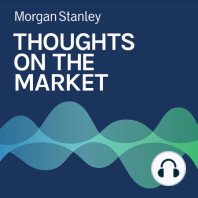3 min listen

Michael Zezas: The U.S. and China, a History of Competition
Michael Zezas: The U.S. and China, a History of Competition
ratings:
Length:
3 minutes
Released:
Aug 4, 2022
Format:
Podcast episode
Description
As investors watch to see if tensions between the U.S. and China will escalate, it’s important to understand the underlying competitive dynamic and how U.S. policy may have macro impacts.--- Transcript ---Welcome to Thoughts on the Market. I'm Michael Zezas, Head of Public pPolicy Research and Municipal Strategy for Morgan Stanley. Along with my colleagues bringing you a variety of perspectives, I'll be talking about the intersection between U.S. public policy and financial markets. It's Thursday, August 4th, at 1 p.m. in New York.This week, Speaker of the House Nancy Pelosi's Asia trip had the attention of many investors as they watched to see whether her actions would escalate tensions between the U.S. and China. In our view, though, this event wasn't a potential catalyst for tensions, but rather evidence of tensions that persist between the two global powers. Hence, we think investors are better served focusing on the underlying dynamic rather than any particular event.The U.S.-China rivalry has many complicated causes, many of which we've covered on previous podcasts. But the point we want to reemphasize is this; this rivalry is going to persist. China is interested in asserting its global influence, which in ways can be at odds with how the U.S. and Europe want the international economic system to function. Nowhere is this clearer than in the policies the U.S. has adopted in recent years aimed at boosting its competitiveness with China.The latest is the enactment of the Chips Plus Bill, which allocates over $250 billion to help US industries, in particular the semiconductor industry, to devolve its supply chain reliance on China for the purposes of economic security and to protect sensitive technologies. Policies like this have more of a sectoral effect than the macro one. But the primary market impact here being a defraying of rising costs for the semiconductor industry. But investors should be aware that there's potential policy changes on the horizon that could have macro impacts. For example, Congress considered creating an outbound investment restriction mechanism in that Chips Plus bill. Such a restriction could have significantly interrupted foreign direct investment in China with substantial consequences for China equity markets.That provision didn't make it into this bill, and with little legislative time between now and the midterm elections, it's unlikely to resurface this year. That's cause some to conclude that it's likely to be years before such a provision could become enacted, particularly if Republicans take back control of one or both chambers of Congress creating a risk of gridlock.But we'd caution that's too simple of a conclusion. The concept of outbound investment restrictions enjoys bipartisan support. So we think investors should be on guard for this provision to get serious consideration in 2023. We'll, of course, track it and keep you informed.Thanks for listening. If you enjoy the show, please share thoughts on the market with a friend or colleague or leave us a review on Apple Podcasts. It helps more people find the show.
Released:
Aug 4, 2022
Format:
Podcast episode
Titles in the series (100)
Mike Wilson: Are U.S. Economic Indicators Flashing Yellow? by Thoughts on the Market